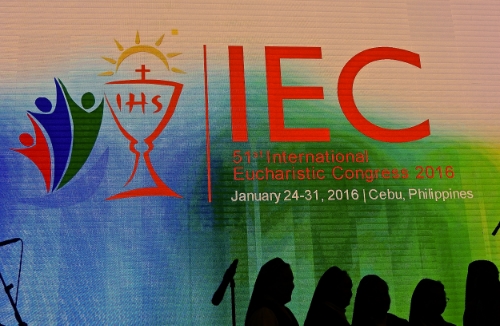REFLECTIONS by Anny Misa Hefti (Global FWN100™ '15)
International Eucharistic Congress 2016
Cebu City, Philippines
The Cebuanos should be proud that IEC passed with flying colors. An event in that dimension needed a lot of preparation, logistics and of course, a huge budget. The organizers never wavered. They persevered and delivered.
Starting January 2015, Philippine parishes asked mass-goers to deposit one peso coins in a special box supporting IEC. They called it "piso para sa mundo", one peso for the world. It was truly heartwarming to watch simple folks and children happily dropping their coins into the collective fund week after week. At the end of the year, the coins amounted to P50 M. The IEC was a huge success because of the sincere concern of all involved – a concern and care that comes from the heart: the Christ in you.
The Holy Eucharist is the heart of our Christian faith. This congress highlighted the very significance of Consecration when bread and wine become flesh and blood of Jesus Christ. Taking the Holy Communion literally means taking Jesus Christ into our bodies. The Christ in you, spiritually. If we understand the gravity of what this means, we become a truly very different person. We become Jesus Christ, who practiced humility, was compassionate, loving, forgiving and an epitome of goodness, and kindness. I sat there, listening to the words of Bishop Barron of L.A., and thought – yes, if I have Jesus Christ in me, I should not be negative towards others, I should not be judgmental, I should not be the all-knowing-intellectual my academic background conditioned me to behave. I should take on Jesus Christ as my role model.
The video message of Pope Francis projected on giant screens around the grounds of Pedro Calungsod Shrine clearly sent a message to the IEC pilgrims and visitors: “Teach what you learned.”
I will heed the call of Pope Francis. I am not much into heavenly verses nor am I religious per se. I consider myself a spiritual person though, something between me, my psyche and the world around me – an inner bonding. At IEC, despite the crowd, I felt the strong presence of God – unseen but strongly omnipresent. The Lord has invited us to join him into his heart for love and kindness. It is up to us to extend this love and kindness beyond ourselves.
I did not attend all the sessions, but those I did made strong impressions on me. Cardinal Luis Antonio Tagle was a witty, engaging speaker. His theme was “The Eucharist and the Dialogue With Cultures”. It was a trenched subject matter, compelling and potent. Dialogue WITH cultures entails cultural intelligence. Cultural Intelligence is the ability to facilitate dialogue between cultures. C I means understanding one’s own culture, seeing how one’s way of life affects people and religion. C I means openness to other cultures affirming the beauty of each different culture. A big danger today is the easy condemnation of other cultures. Cardinal Tagle also reiterated at restoring family values – restore the family meals. He said: the basic unit of the meal is the table, the common table. Nowadays, the basic unit of the meal is ‘my plate.’ And if I have my plate with food on it, I can go anywhere and by myself. But that is not a meal. That is just eating. Individualistic persons know how to eat, but they don’t know how to participate in a meal,” the cardinal said. This is rather a strong point.
Cardinal Bo from Myanmar gave emphasis on the importance of concerns for the youth. He said, 52% of Philippine population are under 25 years of age. He said, “ Never be judgmental but understanding of the youth. The youth deserves to be understood. The future belongs to the young people. Redefine parent, parenting and parenthood.
Cardinal John Onaiyekan of Nigeria delved on discrimination, poverty and the Eucharist. He said, “there is a kind of poverty that cannot be welcomed, ‘misery’. A material poverty that ends up in misery, in deprivation of the main essentials in life cannot be a good thing. He also talked of poverty manifested by selfishness and indifference; spiritual poverty, as the main cause of unhappiness in the world and a great obstacle to peace.
There were personal testimonies to accompany most of these “speeches” (more of a homily to me) from the cardinals. These testimonies were very eloquent. A former street child, Maggie, told a teary-eyed crowd how she scavenged the streets to survive. She found healing in an organization that gave her a new start, a new life through education. She volunteers now at the Saturday Street Children Encounter, teaching street children like her former self, hygiene, catechism, recreational activities. She hoped that more groups and organizations would reach out to street children.
The testimony of Mary Sarindhorn from Thailand was truly inspiring. She became a “corporate fugitive”. She was falsely accused and was on the run for 12 years. But she never stopped praying. One night while feeling so helpless and wanting to end everything, a voice seemed to say, “do not give up, my child. The truth will prevail. God has a mission for you”. The word that flashed to her was “forgive”. She thought, “If I continue to live, I must learn to forgive”. From there on, she came out of hiding and pursued the rigors of proving her innocence. She tells her story in a book, “ Moving the Mountain”. She urges people to use their life stories to bridge and bring people to God. Mary Sarindhorn received a standing ovation at the IEC.
At the end of the day, what matters is being a better person than yesterday, touching the goodness in people around you, that hopefully creates a ripple effect kindling goodness beyond ourselves.

